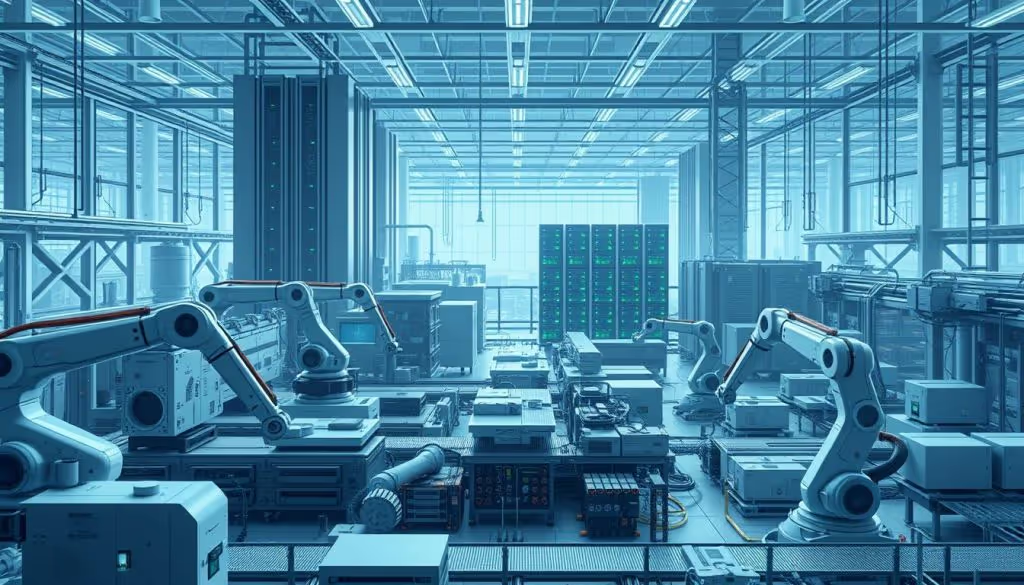Embedded industrial systems for industry
Embedded systems are revolutionizing Industry 4.0. These technologies are transforming production processes and optimizing operational efficiency. Syscom-Prorep, with 30 years' experience, excels in the integration of industrial electronics and IT solutions.
These systems are ubiquitous in our daily lives and essential in a variety of critical sectors. From household appliances to aerospace, they shape the modern industrial environment. Their influence extends to automation, robotics, biomedical and renewable energies.
Embedded systems are evolving in response to growing needs for computing power and mobile communications. These advances present unique challenges in terms of energy consumption and industrial adaptation.
The choice of programming language depends on project requirements. C, C++, Java or Python are selected according to the specific needs and expertise of the developers.
Key points to remember
- Embedded systems are at the heart of Industry 4.0
- Syscom-Prorep: 30 years of expertise in industrial solutions
- Varied applications: from household appliances to aerospace
- Challenges: computing power and energy efficiency
- Choice of language according to specific project needs
- Major impact on industrial digital transformation
Introduction to embedded systems in modern industry
Embedded technologies are revolutionizing modern industry. Ubiquitous in 90% of electronic devices, they are the driving force behind digital transformation. Their influence extends to all sectors, from automotive to aeronautics.
The evolution of on-board technologies
The boom in on-board technologies is spectacular. A modern car can contain up to 100 million lines of code. This complexity meets the requirements of Industry 4.0, which favors precision and speed.
Impact on digital transformation
Embedded systems are the backbone of digital transformation. They facilitate machine-to-machine communication and integrate artificial intelligence. Connectivity solutions such as LoRa, GNSS, Wi-Fi and Bluetooth are essential to this revolution.
Companies such as Syscom-Prorep offer these innovative technologies. They enable unprecedented systems integration in the modern industrial environment.
Strategic role in Industry 4.0
In Industry 4.0, embedded systems are crucial. They perform vital functions in 50% of automotive applications, including driver assistance. Their reliability is paramount: ABS must react in milliseconds.
Faced with these challenges, the industry is investing massively. Annual growth of 6% is forecast until 2028, testifying to the strategic importance of these technologies.
Fundamentals of embedded industrial systems
Embedded industrial systems are at the heart of modern technological innovation. Ubiquitous in our daily lives, they can be found in smartphones, cars and medical devices. Their role is crucial in industry, boosting competitiveness in sectors such as automotive, defense and energy.
Microcontrollers are the core element of these systems. Designed for low power consumption, they are ideally suited to stand-alone applications. More complex microprocessors can run complete operating systems in more sophisticated configurations.
Real-time systems are essential in industrial embedded systems. They execute specific tasks within predefined timescales, ensuring reliability and precision in industrial operations. Syscom-Prorep offers industrial PCs and module-based systems tailored to the needs of modern industry.
- 70% of embedded systems are used in the automotive industry
- 60% of embedded systems require efficient energy management
- 75% of projects implement rigorous testing to guarantee reliability
These systems are mainly programmed in C and C++, accounting for around 80% of projects. Developers rely on IDEs such as STM32CubeIDE or MCUXpresso to create innovative, high-performance solutions.
Key technologies and components
Embedded industrial systems rely on state-of-the-art technologies for optimum performance. They incorporate powerful processors, high-performance communication interfaces and robust real-time operating systems.
Processors and microcontrollers
Embedded processors are essential in modern industrial systems. They are characterized by low power consumption and high computing power. These components manage 90% of specific tasks in everyday electronic devices.
Communication interfaces
Communication interfaces are crucial to the connectivity of embedded systems. They enable real-time data exchange between different components. Syscom-Prorep offers advanced solutions such as LoRa, GNSS, Wi-Fi and Bluetooth to optimize these exchanges.
Real-time operating systems
Real-time operating systems guarantee the responsiveness of embedded systems. They fall into two categories: 60% are soft real-time, 40% are hard real-time. These systems ensure precise management of critical tasks.
<table class="has-fixed-layout"><tbody><tr><th>Composant</th><th>Fonction</th><th>Impact</th></tr><tr><td><b>Processeurs embarqués</b></td><td>Traitement des données</td><td>Augmentation de 15% de l'efficacité opérationnelle</td></tr><tr><td><b>Interfaces de communication</b></td><td>Échange de données</td><td>50% d'augmentation du déploiement dans les infrastructures urbaines</td></tr><tr><td><b>Systèmes d'exploitation temps réel</b></td><td>Gestion des tâches critiques</td><td>Réduction de 30% du taux de mortalité routière</td></tr></tbody></table>Applications in critical sectors
Embedded applications are essential to industry. They bring major advances in safety and performance to the aeronautics, automotive and medical sectors. These technologies are radically transforming these critical sectors.
Aerospace and defense
On-board systems account for a third of aircraft manufacturing costs. They guarantee the reliability and safety of aircraft. The DO-178B standard classifies avionics software into 5 levels of criticality.
These levels range from A (catastrophic loss) to E (no impact). This classification underlines the crucial importance of these technologies in aviation.
Automotive & Transportation
The automotive industry is increasingly integrating on-board applications. These systems manage critical functions such as braking and power steering. They improve road safety and increase vehicle autonomy.
Medical and health
Embedded systems are revolutionizing healthcare. They equip diagnostic devices and patient monitoring systems. These technologies enable more precise treatments and real-time monitoring.
The embedded systems sector in France is growing by 4% a year. Specialized training programs, such as the Mastère Spécialisé® Systèmes Embarqués, meet this demand. Leading companies such as Thales and Valeo support these programs.
Architecture of modern embedded systems
Modern embedded architecture is crucial to industrial evolution. In 2013, the French market was worth 73 billion euros, or 3.7% of GDP. The industry employs 387,500 people, representing 1.3% of the French workforce.
System design integrates a variety of components. Processors have different instruction sets, with different word sizes. Memory access differs, sometimes requiring elementary operations or specific devices.
Hardware-software integration is essential. Operating systems manage resource sharing and hardware access. Application partitioning optimizes execution, taking into account processor capacities and means of communication.
Syscom-Prorep offers innovative solutions such as module-based systems and industrial PCs. These products offer flexibility and power for modern industrial applications. They meet size, power and performance requirements.
Development on these complex architectures requires specific tools. Cross-compilation environments are essential. They enable development for a target processor in an environment running on a host processor.
Safety and reliability of embedded systems
Modern embedded systems demand industrial cybersecurity and flawless reliability. These technologies are crucial in critical sectors such as automotive and medical. Their performance and security must be optimal to guarantee flawless operation.

Industrial cyber security
Protection against cyber threats is vital in today's industry. Embedded systems require robust security measures such as encryption and authentication. These defenses preserve data integrity and ensure business continuity in the face of potential attacks.
Redundancy and fault tolerance
Maximum reliability of embedded systems is based on redundancy and fault tolerance. These techniques enable continuous operation despite potential failures. Redundancy duplicates critical components to ensure continuity.
Fault tolerance, on the other hand, enables the system to adapt. It maintains essential functions despite errors, guaranteeing constant performance.
Certifications and standards
Industry standards guarantee the quality and safety of embedded systems. Certifications such as IEC 61508 establish strict criteria for their design and operation. Compliance with these standards ensures that systems meet the highest standards.
<table class="has-fixed-layout"><tbody><tr><th>Aspect</th><th>Importance</th><th>Techniques</th></tr><tr><td>Cybersécurité</td><td>Critique</td><td>Chiffrement, Authentification</td></tr><tr><td>Fiabilité</td><td>Essentielle</td><td>Redondance, Tolérance aux pannes</td></tr><tr><td>Conformité</td><td>Obligatoire</td><td>Certifications, <b>Normes industrielles</b></td></tr></tbody></table>The safety and reliability of embedded systems are essential in modern industry. Their implementation requires advanced technical expertise and constant vigilance. These strategies guarantee performance and durability in the face of emerging threats.
Connectivity solutions for industry
Industrial IoT is transforming production with advanced connectivity solutions. Wireless networks such as LoRa, Wi-Fi and Bluetooth facilitate M2M communication and real-time data collection.
Industrial cellular routers have to withstand extreme conditions. They can withstand temperatures ranging from -20°C to 74°C. In the oil industry, these devices monitor equipment in hazardous environments.
The Digi IX30, a 4G LTE router, illustrates these technological advances. Designed for industrial automation, it operates in C1D2 environments in accordance with ISO 14001. It offers connections via Ethernet, serial I/O, USB and Modbus.
Centralized management facilitates the deployment and maintenance of industrial devices. Remote updates reduce costs and complexity. Security remains paramount in this field.
Secure-IC solutions comply with IEC 62443 standards. They guarantee secure connectivity for modern industrial systems. These innovations ensure the efficiency and reliability of industrial operations.
Artificial intelligence and embedded systems
Embedded AI is revolutionizing industrial production processes. It enables autonomous decision-making and continuous optimization. This technology is radically transforming industry, offering unprecedented benefits.
Embedded Machine Learning
Industrial machine learning is establishing itself as a pillar of technological innovation. Sensors collect environmental data essential for analysis. Microprocessors process this information in real time, enabling rapid adaptation to changes.
Real-time processing
On-board AI excels at instantaneous processing of complex information. Intelligent robots navigate difficult environments with precision. In aeronautics, predictive maintenance uses sensors to monitor the condition of components.
Performance optimization
Process optimization is the major asset of embedded AI. Autonomous vehicles use it for mapping and route planning. In industry, it improves energy efficiency and reduces operating costs.
Embedded systems engineers need to master AI algorithms. Knowledge of languages such as C++ and Python is crucial. These skills will enable them to exploit the full potential of these technological advances.
Future trends and innovations
The global market for industrial embedded systems is expected to reach USD 103.02 billion by 2029. An annual growth rate of 6.60% is forecast. Edge computing, industrial 5G and autonomous systems are driving this expansion.
Edge computing is revolutionizing the industry by processing data close to its source. This approach reduces latency and improves system responsiveness. Industrial 5G is emerging as a catalyst for ultra-fast, reliable communications.

Autonomous systems integrate artificial intelligence to make decisions without human intervention. This development is benefiting from substantial investment. The $12 million collaboration between IBM and MIT illustrates this commitment.
<table class="has-fixed-layout"><tbody><tr><th>Tendance</th><th>Impact</th><th>Prévision</th></tr><tr><td><b>Edge computing</b></td><td>Traitement des données optimisé</td><td>Adoption croissante dans l'industrie</td></tr><tr><td><b>5G industrielle</b></td><td>Communications ultra-rapides</td><td>Déploiement massif d'ici 2025</td></tr><tr><td><b>Systèmes autonomes</b></td><td>Prise de décision automatisée</td><td>Intégration dans 80% des dispositifs d'ici 2029</td></tr></tbody></table>These innovations are transforming industry. Companies like Syscom-Prorep are anticipating the future by developing solutions for Industry 4.0. Their vision is shaping the future of embedded industrial systems.
Challenges and opportunities for companies
Digital transformation offers unprecedented opportunities for industrial competitiveness. Embedded systems are essential to this evolution. In 2018, there were 15 billion connected objects. This figure is set to rise to 80 billion by 2020, underlining their growing importance.
The adoption of embedded systems presents challenges for companies. Training is essential. The Mastère Spécialisé® Embedded Systems, supported by Thales and Valeo, trains future experts. This expertise is crucial to optimizing return on investment.
Industry 4.0 is revolutionizing manufacturing. IIoT and AI increase operational efficiency. In connected factories, 80% of objects are equipped with sensors. This interconnection enables rapid decision-making and improves flexibility.
<table class="has-fixed-layout"><tbody><tr><th>Technologie</th><th>Impact sur la compétitivité</th></tr><tr><td>Robots autonomes</td><td>Amélioration de l'efficacité opérationnelle</td></tr><tr><td>Jumeaux numériques</td><td>Optimisation de la maintenance</td></tr><tr><td><b>Edge computing</b></td><td>Réduction des délais de réponse</td></tr><tr><td>Analyse prédictive</td><td>Anticipation des problèmes</td></tr></tbody></table>These innovations offer a considerable competitive advantage. However, they require significant investment and adaptation of processes. ROI depends on successful integration into the company's overall strategy.
Conclusion
Innovative embedded systems are shaping the future of industry. Ubiquitous in modern electronics, they are transforming key sectors. The market, estimated at $120 billion in 2022, is expected to reach $200 billion by 2027.
These technologies are revolutionizing the automotive industry, with 70% integration, and the medical sector, where they are present in 50% of devices. Their widespread adoption is improving efficiency and safety in a variety of fields.
A solid technological partnership is crucial to success in this expanding field. Syscom-Prorep stands out as an ally of choice. The company offers expertise and innovative solutions to harness the potential of embedded systems.
Working with experts enables industries to meet today's challenges. It also gives them the means to anticipate the innovations that will shape the industrial future.

